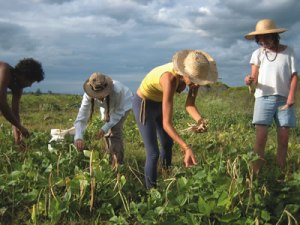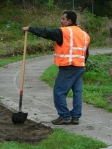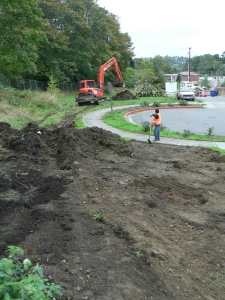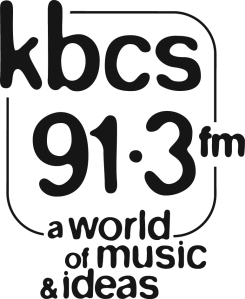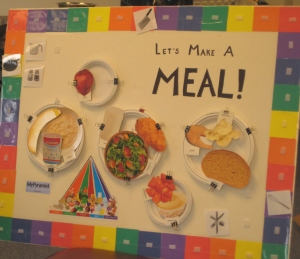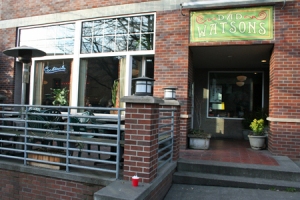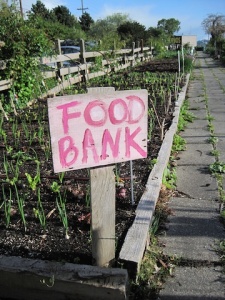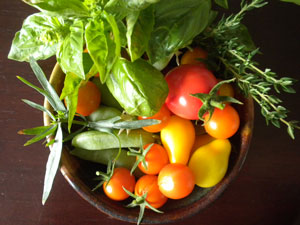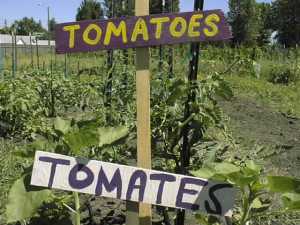Posted on July 19, 2011 by Liz Reed Hawk
(Editor’s note: This is the main story reprinted from our July 2011 Groundviews newsletter. To read the complete newsletter or past issues of Groundviews, please visit our Publications webpage.)

On a cool, drizzly June day, Sudi convinced his 7-year-old brother to join him at a work party at the new farm nestled within their housing complex. They helped move the last load of dirt into neat rows, soon to be planted. Scott Behmer, Seattle Community Farm Coordinator, says that when he started in the fall of 2010, the Farm was little more than “a grass field and a parking lot” near Rainier Vista (a mixed-income housing community just off MLK Way in South Seattle). Today, after two+ years of planning, community meetings and “a lot of physical work moving in 200 cubic yards of soil and tens of thousands of pounds of other materials,” the 1/3-acre Farm is fully planted and celebrated its official Grand Opening on June 25.
Seattle Community Farm is the newest project of Solid Ground’s Lettuce Link program, which works with and in communities to grow and share fresh, nourishing food, and envisions a city where people have equal access to healthy and culturally appropriate food. Scott says, “Our goal is to get vegetables to folks who struggle to afford them.”
Cross-cultural community building
Getting the new Farm to where it is today has been a true organizing effort: Lettuce Link worked with many partners, including Seattle’s P-Patch Program, landscape designer Eric Higbee (who donated his services) and Seattle Housing Authority.
Lettuce Link Program Manager, Michelle Bates-Benetua, says, “Together, we crafted and carried out a culturally relevant engagement process so the community could tell us what they wanted. It may take longer and it is more expensive to provide food, childcare and interpretation, but our intent is to work together with the neighborhood so that in a few years, they run the Farm and we’ve worked ourselves out of a job.
“The grand vision is that the community is able to produce food together across cultures and language, share that food among themselves and with the Rainier Valley Food Bank, and utilize the gathering space as one community instead of several distinct groups living in one neighborhood.”
Mariah Pepper, an AmeriCorps*VISTA serving this year as Seattle Community Farm’s Outreach Coordinator, says, “It’s an interesting neighborhood; Rainier Vista is a mixed-income housing development, so there’s every kind of person you can imagine.” Residents run the gamut from Seattle Housing Authority seniors and people living on very low incomes, to Habitat for Humanity homeowners, to renters and homeowners affording full-market rates.
Seattle Community Farm is built on a Work Trade model Scott describes as “one way to try to make the volunteer model work for people where time might mean a lot more because they’re lower income and might work more jobs. Basically, if you work two hours, you get a bag of vegetables,” worth about $30/bag. “So you’re not just volunteering, you’re coming and working in exchange for vegetables.”
Michelle says, “The goal is to make sure our volunteer opportunities are accessible and meaningful for the community” – and yet this poses challenges. The Rainier Vista area is extremely culturally diverse: Residents speak approximately 50 different languages. Mariah says, “With so many languages and so many cultures, it makes outreach a bit difficult, because there are so many different ways that people interact with each other – and a sea of information. And that’s the thing we’ve all learned: We have to have multiple ways of getting information out there.”
When possible, staff use interpreters and have outreach materials translated into multiple languages. Scott says Rainier Vista has “a lot of community events. So we’re going to those, and going door to door, leaving flyers and talking to people.”
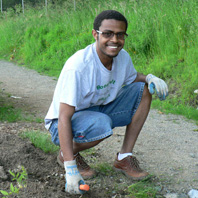
Sudi, a Seattle Community Farm volunteer and Rainier Vista resident
Good chemistry
Sudi is one young resident who both volunteers regularly and is helping get the word out to other residents. Originally from Ethiopia, his family has lived at Rainier Vista for six years. Having just finished his third year studying chemistry at St. Martin’s College, he says his dad asked him to come out to volunteer one day, and they happened to be doing a class on composting. “We talked about fertilizers and nitrogen, and so I get interested when I hear that!” Sudi says, “I think it is wonderful. Aside from just doing the work, you actually learn how to grow plants. We have fun talking about different kinds of plants, and it’s just a learning experience.
“I try to get people involved here in the neighborhood. Scott gave me flyers, and one day I took it down and gave it to some people – trying to explain the reason behind it. The reason why this is here, from my understanding, is this is a (mostly) vegetable garden – and trying to get more nutritions from vegetables into this community, who either don’t know much about the importance of it – or since vegetables are expensive, they don’t get much of it. Having it here, and them working on it and harvesting it themselves, is a big thing.”
Scott says, “It’s always great to get volunteers from the community to come out and work, and hear a little about them, and see them enjoy it.” Mariah adds: “Food is so connected to culture – so it’s a way to talk about how we grow things, how we cook things and eat things, and have a conversation across these differences. I would like to see the Farm be able to bridge that.”
For more information about the Seattle Community Farm, please contact 206.694.6828 or urbanfarm@solid-ground.org, or visit www.solid-ground.org/Programs/Nutrition/CommunityFarm.
Filed under: My Story | Tagged: Food & Nutrition, food justice, gardening, Lettuce Link, sustainable agriculture | Leave a comment »






